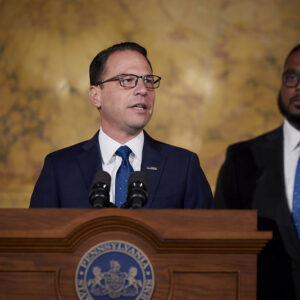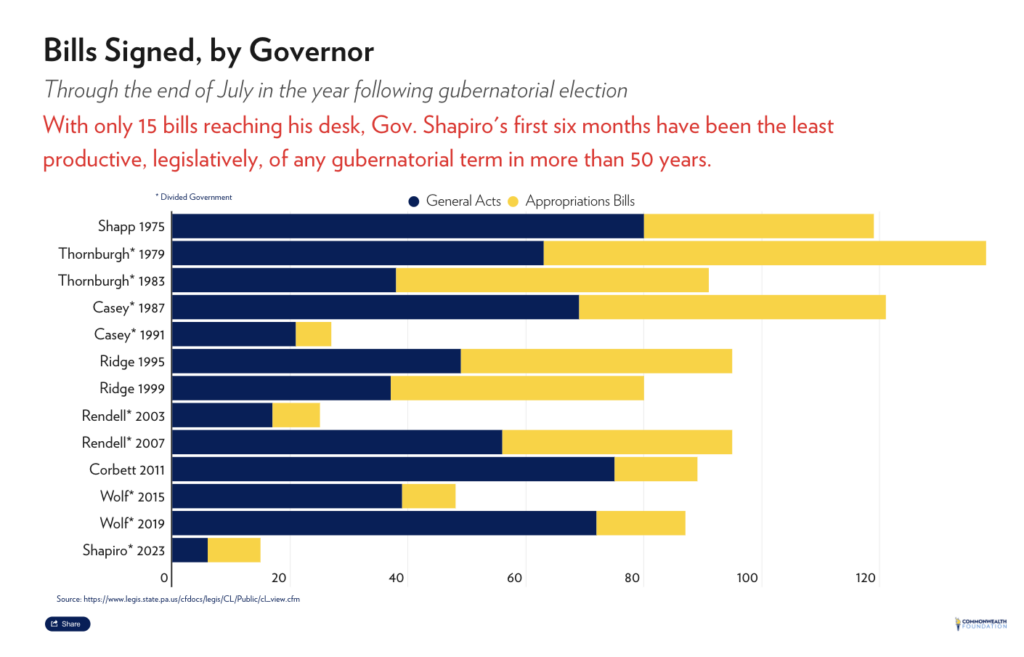Gov. Josh Shapiro isn’t getting high marks for his first six months as Pennsylvania’s head of state.
An analysis by the Commonwealth Foundation found the Democrat’s freshman legislative session the least productive in five decades.
According to the analysis, the 15 bills Shapiro enacted—the majority being appropriation bills—represent about one-sixth the average number of bills (86) passed by previous freshman governors through the end of July.
“Gov. Shapiro pledged to deliver a new leadership style to Harrisburg, but so far, this style has been defined by legislative dysfunction and the abandonment of commonsense reforms,” said Commonwealth Foundation Director of Policy Analysis Elizabeth Stelle. “Shapiro’s ‘freshman 15’ has failed to address economic stagnation, out-of-control spending, or education.”
In second place was Ed Rendell for his first gubernatorial term in 2003, which featured a whopping 17 new laws and eight appropriations bills. Bob Casey Sr.’s second term in 1991 involved 21 new general acts and six appropriations bills. Pennsylvania typically averages 86 bills enacted during the same period.
The state’s divided government is partially responsible for the lack of progress. Commonwealth Foundation noted House Democrats could end up holding only 45 voting sessions this year. That was the lowest since 1964. The House is on vacation until late September.
State Sen. Dave Argall (R-Carbon), the Senate Republican Campaign Committee chairman, isn’t impressed by Shapiro’s performance thus far.
“Gov. Josh Shapiro missed a great opportunity to work across the aisle and keep his promise on Lifeline scholarships. Unfortunately, he fumbled on a bipartisan policy goal.”
However, former Montgomery County state Sen. Bob Mensch (R) said the analysis was somewhat unfair to the freshman governor.
‘The number of legislative bills is no measure of legislative success,” Mensch told DVJournal. “In fact, as a conservative, the fewer bills, the better is a general rule. As a legislator, I felt satisfaction when defeating what I deemed to be bad bills, and I believe the GOP caucus feels the same.
The bigger story, Mensch said, “is the dysfunction within the Democrat Party. First, with the less-than-serious approach to electing their first speaker in January 2023. Then the Democrat Caucus’ betrayal of the governor’s commitment to school choice—a betrayal led by the House Majority Leader in concert with the teachers unions.”
Mensch’s view of the divide among Democrats is, perhaps unsurprisingly, shared by Jason Gottesman, a spokesperson for House Republicans.
“This session has been historically unproductive because House Democrats continue to run a unilateral extremist agenda that cannot receive buy-in from the Republican Senate,” Gottesman said.
Since the start of this session, House Democrats have refused to answer questions in open session about their legislation 22 times, tabled 13 Republican amendments, used procedural maneuvers to prohibit Republicans from offering amendments 117 times, and cut off all debate on legislation twice Republicans say.
“Earlier this year, House Republicans with The Keystone Commitment laid out a policy platform that can move Pennsylvania forward by addressing concerns shared by everyone in this commonwealth. If House Democrats want to be successful in driving a policy agenda that can have broad, bipartisan appeal, they should be working with us instead of using every political trick and imagined parliamentary maneuver to shut us down.”


